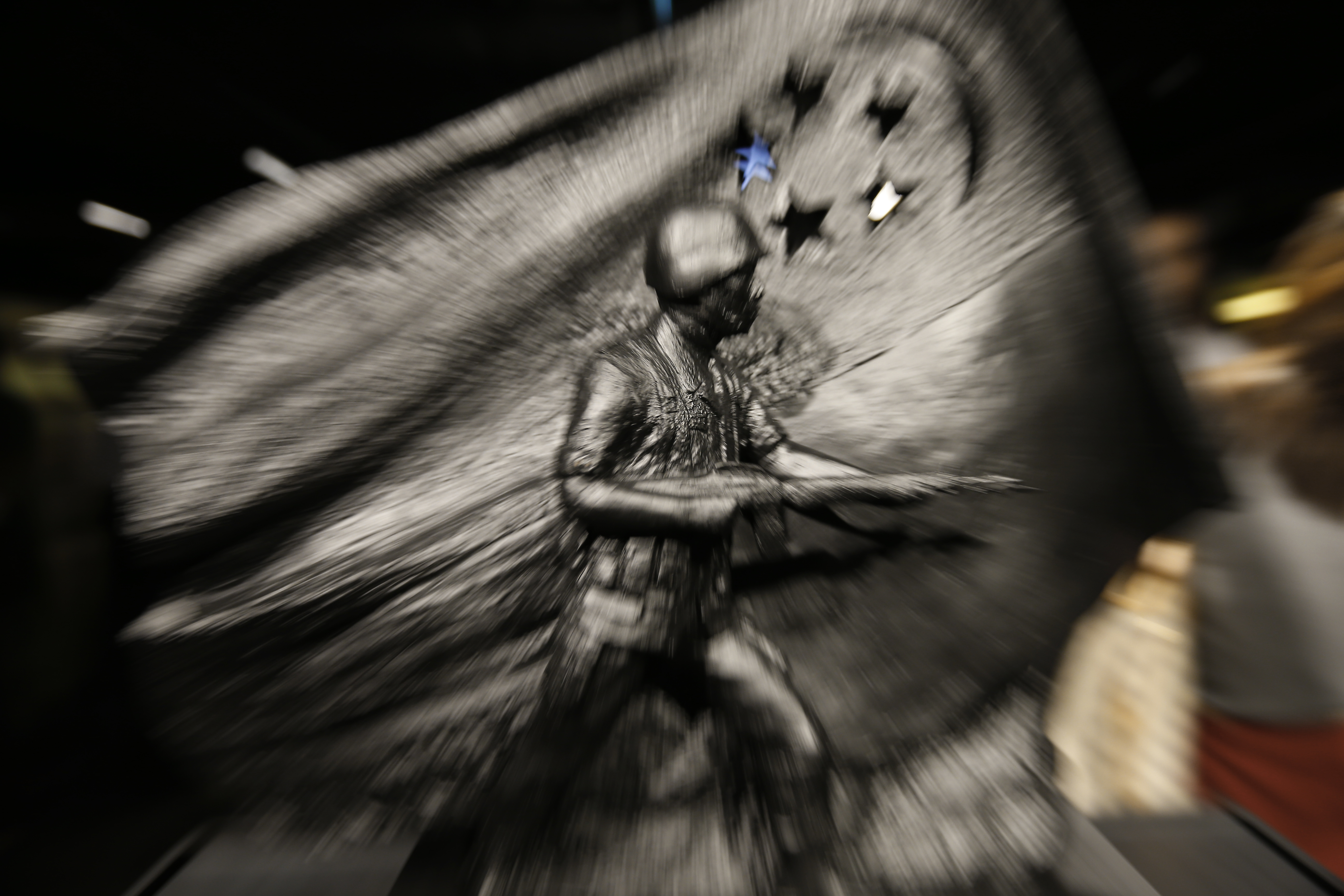INT: SINGAPORE, NIGHT: A soldier stands alone in a dark room.
SOLDIER: “They left me to my own devices to the point that I almost killed myself. They didn’t take action. If my colleague did not report it, I would be dead already.”

Ridiculing God, religion and national service
It was 1993 in Singapore when the audience fell silent. Over the course of the premiere of the play, something in them – something in the city-state – had changed.
“It was a quiet, stunned audience that left the Drama Centre on Wednesday night,” one reviewer wrote. She, like the rest of the crowd, had just witnessed the birth of what would become one of the country’s most renowned pieces of theatre.
Since its premiere more than 15 years ago, Off Centre, a play by theatre company the Necessary Stage, has been incorporated into the national school curriculum, where students study it alongside works by William Shakespeare and Tennessee Williams. The work has also been adapted into a film and reproduced for the stage six times, most recently in February this year.
But it wasn’t always held in such high regard.
The play was originally commissioned by the Ministry of Health with the aim of raising awareness of mental health issues in the city-state. But when playwright Haresh Sharma submitted the script, the government was shocked. They demanded changes, denouncing the play as violent and non-educational.
That is what mental illness does to you. You need a trigger, and that trigger happened to be that moment of stress during national service
Haresh Sharma
According to the head of public affairs at the Ministry of Information and the Arts at the time, Sharma’s play “presented a prejudiced view of mental disorder, its treatability and the therapists, besides ridiculing God, religion and national service.”
Sharma and the others involved in the play refused to make changes, and lost out on the roughly SGD 30,000 ($22,000) of funding that had been promised to them. They continued to work on the production for free.
The final version of the play that premiered that night in September 1993 was one that laid bare the suffering of people experiencing mental health issues in Singapore at the time.
It tells the story of two characters; Vinod, who is experiencing depression, and Saloma, who has schizophrenia.
In one controversial scene in the play, Vinod is bullied by an army senior while he is serving national service. In Singapore, it is mandatory for all males and second-generation permanent residents to serve time in the military, usually from around the age of 18, except under extreme circumstances such as severe illnesses or disabilities. It is a subject that is rarely openly criticised in the country.
For the character Vinod, the abuse is hard to bear. This stress, and others, would later drive him to suicide.
“I had to show [the character’s] breakdown at some point,” Sharma told Southeast Asia Globe.
“That is what mental illness does to you. You need a trigger, and that trigger happened to be that moment of stress during national service,” he said.
Sharma insists his play was not a criticism of national service, explaining that everyone has different experiences in the army, some positive, some negative.
But while Vinod’s breakdown and suicide live on through actor after actor across the years, the impacts of mandatory national service on mental health are all too real for many Singaporeans.

Mia’s story
Mia is just one of those Singaporeans. Sitting in a shaded garden bar in Phnom Penh, Cambodia, using her chosen name and not her birth name, she spoke out against the treatment she faced by the military.
“It wasn’t because of them that I survived – it was because I made the decision to talk to my colleague and my colleague made the decision to call them. That’s why I lived,” she said.
She was that soldier standing in her room. Those words from the darkness were hers.
Mia is Singaporean and a transgender woman, and carried out her national service between 2003 and 2005 while identifying as a man.
There was an edge of anger in her voice as she explained the time leading up to her suicide attempt during her national service.
Mia declared on entering the military that she had been diagnosed with depression and a mild form of schizophrenia.
If you don’t report back tomorrow, we will send people to arrest you
Military officer
On her first week at the base after her Basic Military Training (BMT), her mother died unexpectedly. Mia broke down.
“My superiors tried to get me to tell them what was wrong but I could not,” she said. “I managed to do it in the end. They drove me down to my mum’s house…It was just a horrible experience.”
The funeral lasted one week. After, Mia received a call. It was the military demanding to know why she hadn’t reported back to base. They informed her that her absence had used up all her days of compassionate leave and her days of annual leave.
“It’s been a week since my mum died and I’m trying to get my shit together,” Mia told them.
“If you don’t report back tomorrow, we will send people to arrest you,” the officer replied.
Mia returned to base.
Because Mia declared mental health issues on beginning national service, she was given a special status, known as PES E. Anyone given this status only needs to serve two weeks of BMT – instead of the nine weeks demanded of those in the top categories of fitness and health – and is then given a non-combat role. Mia was posted to Changi Military Base West, where she had the job of routine order clerk.
When she returned to the base after her mother’s passing, she was required to see a counsellor, but according to Mia, the woman couldn’t understand her problems. “She did buy me Starbucks coffee and was sympathetic, but it was hard for her to be in my shoes,” she said.
A few months later, she tried to take her life.
“It’s funny because I was returning a gym key to my colleague, and he said, ‘so, see you tomorrow’, and I said, ‘no you won’t,’ and I just walked away.”
Her colleague acted quickly and called his superiors, who made it to Mia in time.
She was taken to the Institute of Mental Health (IMH). They wanted to “lock her up” for two weeks, according to Mia, but she managed to get out after four days as her father was in town and convinced the doctors to let her leave.
She described her time in the IMH as “crazy”, saying patients were screaming and standing over her bed at night. She believes that her food was drugged without her consent, saying that she would become drowsy shortly after being given coffee with her breakfast. Southeast Asia Globe contacted the IMH to ask about the treatment provided to patients, but a spokesperson declined to comment on the hospital’s practices.
After her suicide attempt Mia was sent to see a psychologist, who put her on anti-depressants. At this point she was given a choice: to continue with national service or drop out and not complete her time – a status known as PES F.

She chose to continue. Taking PES F can lead to many disadvantages for Singaporeans, such as having lower priority for housing, being denied access to certain grants, and being discriminated against by employers.
Mia eventually completed national service, but said the experience remained with her for years to come.
“I would say it definitely affected me in a huge way in the sense that [the senior officers] didn’t give me time to grieve,” she said. “They did not give me adequate service in terms of health care or medical care. My seniors were not trained to deal with things like trauma.”
And in some instances, that lack of training can prove fatal.

The deaths
In September 2018 there were two separate suicides of national servicemen. There is little public information available, but the Ministry of Defence has said that investigations are ongoing. While these two deaths stand out for occurring so close together, they are far from the only examples of suicides of NSF.
In 2017, 18-year-old Muhammad Ahad Lone took his life while enrolled in national service. According to a report written by a police investigation officer at the time, Ahad went to see a doctor at least 13 times before eventually being referred to the IMH for suicidal thoughts and depression.
Despite reporting that his mood was low and he felt suicidal, Ahad was not considered by doctors to be an immediate suicide risk. He was diagnosed with adjustment disorder and depressed mood, and told to report back in four to six weeks. He never did.
Following the trail back further leads to Ganesh Pillay Magindren, who took his life in 2014 while carrying out national service.
A report by state coroner Imran Abdul Hamid stated that a combination of a lack of communication between senior officers and a lack of understanding of mental health disorders by the officer in charge of Ganesh contributed to the deterioration of his mental state.
Ganesh was diagnosed with schizophrenia and given the lowest PES E level. But according to the testimony of one of Ganesh’s campmates, he was treated harshly by his commanding officers.
The army captain in charge gave Ganesh 14 extra weekend duties the day before his death. The captain admitted to not knowing what schizophrenia was. The coroner Imran said that “she was out of her depth to handle the deceased.”
After the death, the Ministry of Defence held a counselling session for the family of Ganesh, but his sister wrote in an article for the Independent Singapore that it felt more like a survey. The grieving family was asked a slew of bureaucratic questions, including: “how close was the family to the deceased, grade from one to five.”
Cases of suicides are rare and for most Singaporeans national service is at worst an inconvenience, but Mia believes there are thousands of people out there whose mental health has suffered because of it.
And for those who want to speak out, the prospect of publicly criticising any aspect of national service can be a daunting one.

‘Are you suicidal?’
Southeast Asia Globe contacted and spoke to a range of Singaporeans about their experiences in the national service. All of them asked not to be named for fear of repercussions by the city-state’s authoritarian government.
One 24-year-old who is currently studying at Nanyang Technological University (NTU) in Singapore, spoke of dealing with depression while carrying out his national service. He served between 2015 and 2017. Like Mia, he was suicidal.
One week into BMT, all the new national servicemen (NSF) were given a form to fill in. One question asked: “Do you have suicidal thoughts?”. The NTU student marked yes. A few hours later he was sent to a medical officer.
“This medical officer actually suspected that I was malingering,” the NTU student said, using a term that refers to when people fake illness to be excused from duties.
“He said if I continued to say I was suicidal then he would have to call IMH and tie me up and send me there,” the NTU student said.
“He continued to persuade me to stay healthy and stay in the course because BMT was only a few weeks, after which I could slack in my future units. He asked me to endure through and asked me a final stern question: ‘are you suicidal?’”
The student hesitated for a while, and then caved. “No,” he said.
His depression did not get better. In the third week of training he had a review with a different medical officer, who was more understanding.
The student was sent to the IMH – not tied up as threatened – and then to the Singapore Armed Forces Military Medical Institute. He was pulled out of BMT and given three weeks of leave, before being posted to a position as a clerk. This helped him to recover.
He told Southeast Asia Globe that had he not seen the second medical officer he didn’t know exactly what would have happened, but his “mood and world would definitely have shattered further.”
Despite his experience in the national service, the NTU student, like a majority of Singaporeans, still supports the programme.

Entrenched
The NTU student’s belief in the necessity of national service is a crucial point to the discussion on mental health issues within Singapore’s institutions.
Heryani Jamaludin, a Singaporean psychiatric nurse, said that faith in the national service “is already ingrained in us”.
Its history stretches back over half a century.

In December 1953 the British colonial government tried to introduce a national service, but widespread student-led protests against it proved crucial in galvanising opposition to colonial rule. The idea was dropped.
Fourteen years later, the political landscape had changed. Singapore was newly independent from Malaysia and the government decided it needed to bolster its security forces and once again turned to national service. This time, the citizens took to it.
Founding Prime Minister Lee Kuan Yew justified the decision in his book From Third World to First.
“We thought it important for people in and outside Singapore to know that despite our small population, we could mobilise a large fighting force at short notice,” he wrote.
The majority of Singaporeans that Southeast Asia Globe spoke to believe that the country must have a strong military to continue to survive.
A 2013 report titled Singaporeans’ Attitudes to National Service confirmed this. It surveyed 1,251 Singaporeans and found that there was overwhelming support for national service.
| What are the perceived benefits and impact of national service? Indicators ranked by score (maximum score: 6) | ||
| Ranking | Indicator | Score |
| 1 | National service will continue to be important for Singaporeans in the future | 5.16 |
| 2 | National service is essential / necessary for Singapore’s survival | 5.12 |
| 3 | National service teaches many important life values | 5.03 |
| 4 | National service is a rite of passage for the Singaporean man | 5.01 |
| 5 | National service increases the sense of rootedness in Singapore | 5.00 |
| 6 | National service develops leadership skills | 5.00 |
| 7 | National service makes a person more resilient (able to recover from failures or cope with difficulties) | 5.00 |
| 8 | National service provides opportunities to learn something useful | 4.97 |
| 9 | National service helps Singaporeans understand people from different backgrounds | 4.94 |
| 10 | National service improves one’s civilian employment prospects | 4.58 |
| Data from the 2013 report Singaporeans’ Attitudes to National Service |
The report makes no mention of the experiences of people with mental health issues. The only criticism mentioned is the suggestion that “more could be done to match servicemen’s personal skills and abilities to national service vocations”.

The silence
Conversations around mental health are beginning to take place in Singapore. Jamaludin, the psychiatric nurse, said that in the past five years the government has run campaigns to raise awareness of mental health issues, while celebrities have been talking about it on social media.
But there is still a lot of work to do, Jamaludin warned, saying stigmatisation of mental health issues in Singapore still exists.
“I think the general consensus is that if you’re an ex-prisoner, it’s easier for you to get a job than if you have a mental illness,” she said.
And when it comes to the impact of the national service on mental health, official discussion is scarce.
A spokesperson of the Ministry of Defence stated in an email that there was a range of medical treatment and counselling services offered to full-time national servicemen with mental health issues. They also mentioned providing training to unit commanders on how to deal with people with mental health issues, regular interviews with NSFs and a 24-hour counselling hotline. They did not give specifics on these practices.
Jamaludin doubts the effects of the national service on NSFs’’ mental health will ever be discussed publicly.
“You can imagine the outcry of the public. No mothers would want to send their children to national service…I’m sure [the government] doesn’t want that,” she said.
Mia was one of the only Singaporeans Southeast Asia Globe spoke to who advocated against having conscription.
“It’s important to have a military,” she said, “but it should be professionals, not scared kids.”

At the end of Sharma’s play there is no curtain call. Instead, the actress who plays Saloma remains on stage and with this gesture invites the audience to come to her, to discuss with her and to comfort her. Sharma said this was on purpose.
“We never break away from reality,” he said.
“I want the issues and the characters to stay with the audience – even after they leave the play.”
If you or someone you know is affected by this issue, you can reach out to Samaritans of Singapore for support.


